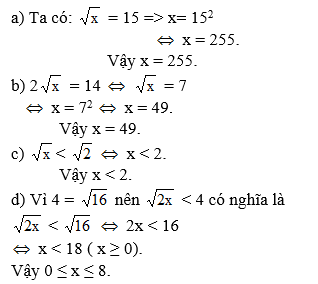Hãy nhập câu hỏi của bạn vào đây, nếu là tài khoản VIP, bạn sẽ được ưu tiên trả lời.

Với câu c, Thiên Anh nên thêm điều kiện để phần kết luận là: \(0\le x< 2.\)

a) = 225
b) 49
c) = 1
d) 1 ; 2 ; 3 ; 4 ; 5 ; 6 ; 7
k nha
a) \(\sqrt{x}=15\)
=> x = 152
=> x = 225
b) \(2\sqrt{x}=14\)
<=> \(\sqrt{x}=7\)
=> x = 72
=> x = 49
c) \(\sqrt{x}< \sqrt{2}\)
<=> x < 2
mà \(x\ge0\)
=> x= {0;1}
d) \(\sqrt{2x}< 4\)
=> 2x < 16
<=> x < 8
mà \(x\ge0\)
=> x = {0;1;2;3;4;5;6;7}
ok mk nhé!!!!!! 53654645756876969251353253434645655435436464556756252345345634

a)\(\sqrt{x}>2\Leftrightarrow\sqrt{x^2}>2^2\Leftrightarrow x>4\)
\(\sqrt{x}< 1\Leftrightarrow\sqrt{x^2}< 1^2\Leftrightarrow x< 1\)

a) 1
b) \(2\sqrt{x-2}+\sqrt{x+2}\)
c)câu này để bạn tự làm nhé

a) 225
b)17:2=7 =>x=47
c)căn 2=1,4142.... mà x ko âm thì dương nên x bằng 1
d)x chắc bằng 1
à lúc mình học lớp 6 hay 7 gì đó thì mấy câu này mình giải như vậy thôi

a) \(\sqrt{x}>1\Leftrightarrow x>1\)
b) \(\sqrt{x}< 3\Leftrightarrow x< 9\)
Vì x không âm nên x={0;1;2;3;4;5;6;7;8}
a)\(\sqrt{x}>1\Leftrightarrow\sqrt{x^2}>1^2\Leftrightarrow x>1\)
b)\(\sqrt{x}< 3\Leftrightarrow\sqrt{x^2}< 3^2\Leftrightarrow x< 9\)

a)\(\sqrt{x}=15\)
=>\(x=15^2\)
<=>\(x=225\)
b)\(2\sqrt{x}=14\)
<=>\(\sqrt{x}=7\)
=>\(x=7^2\)
<=>\(x=49\)
c)\(\sqrt{x}<\sqrt{2}\)
<=>\(x<2\)
mà \(x\ge0\)nên
\(x=\left\{0;1\right\}\)
c)\(\sqrt{2x}<4\)
=>\(2x<16\)
<=>\(x<8\)
mà \(x\ge0\)nên
\(x=\left\{0;1;2;3;4;5;6;7\right\}\)
giải:
a) Vận dụng điều lưu ý trong phần tóm tắt kiến thức: "Nếu a ≥ 0 thì a = (√a)2":
Ta có x = (√x)2 = 152 = 225;
b) Từ 2√x = 14 suy ra √x = 14:2 = 7
Vậy x = (√x)2 = 72 = 49.
c) HD: Vận dụng định lí trong phần tóm tắt kiến thức.
Trả lời: 0 ≤ x < 2.
d) HD: Đổi 4 thành căn bậc hai của một số.
Trả lời: 0 ≤ x < 8.

Bài 2 xét x=0 => A =0
xét x>0 thì \(A=\frac{1}{x-2+\frac{2}{\sqrt{x}}}\)
để A nguyên thì \(x-2+\frac{2}{\sqrt{x}}\inƯ\left(1\right)\)
=>cho \(x-2+\frac{2}{\sqrt{x}}\)bằng 1 và -1 rồi giải ra =>x=?
1,Ta có \(\left(\sqrt{a}+\sqrt{b}+\sqrt{c}\right)^2=a+b+c+2\sqrt{ab}+2\sqrt{bc}+2\sqrt{ac}\)
=> \(\sqrt{ab}+\sqrt{bc}+\sqrt{ac}=2\)
\(a+2=a+\sqrt{ab}+\sqrt{bc}+\sqrt{ac}=\left(\sqrt{a}+\sqrt{b}\right)\left(\sqrt{a}+\sqrt{c}\right)\)
\(b+2=\left(\sqrt{b}+\sqrt{c}\right)\left(\sqrt{b}+\sqrt{a}\right)\)
\(c+2=\left(\sqrt{c}+\sqrt{b}\right)\left(\sqrt{c}+\sqrt{a}\right)\)
=> \(\frac{\sqrt{a}}{a+2}+\frac{\sqrt{b}}{b+2}+\frac{\sqrt{c}}{c+2}=\frac{\sqrt{a}}{\left(\sqrt{a}+\sqrt{b}\right)\left(\sqrt{a}+\sqrt{c}\right)}+\frac{\sqrt{b}}{\left(\sqrt{b}+\sqrt{c}\right)\left(\sqrt{b}+\sqrt{a}\right)}+...\)
=> \(\frac{\sqrt{a}}{a+2}+...=\frac{2\left(\sqrt{ab}+\sqrt{bc}+\sqrt{ac}\right)}{\left(\sqrt{a}+\sqrt{b}\right)\left(\sqrt{a}+\sqrt{c}\right)\left(\sqrt{b}+\sqrt{c}\right)}=\frac{4}{\sqrt{\left(a+2\right)\left(b+2\right)\left(c+2\right)}}\)
=> M=0
Vậy M=0

a/\(\sqrt{x}=7\)
\(\Leftrightarrow x=49\)
b/\(\Leftrightarrow x< 4\)(do x>0)
\(\Rightarrow x\varepsilon\left\{0;1;2;3\right\}\)
c/\(2x< 16\)
\(\Leftrightarrow x< 8\)
\(\Leftrightarrow x\varepsilon\left\{1;2;3;4;5;6;7\right\}\)
a) \(2\sqrt{x}=14\Leftrightarrow\sqrt{x}=7\)
\(\Leftrightarrow x=7^2\Leftrightarrow x=49\)
b) \(\sqrt{x}< \sqrt{2}\Leftrightarrow x< 2\)
c) \(\sqrt{2x}< 4\)
Vì \(4=\sqrt{16}\text{ nên }\sqrt{2x}< 4\text{ có nghĩa là }\sqrt{2x}< 16\)
\(\Leftrightarrow2x< 16\)
\(\Leftrightarrow x< 8\left(x\ge0\right)\)